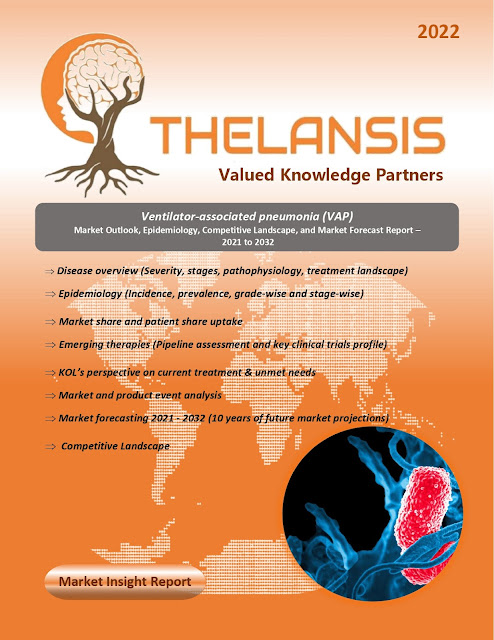Ventilator-Associated Pneumonia (VAP) – Market Outlook, Epidemiology, Competitive Landscape, and Market Forecast Report – 2021 To 2032
Ventilator-associated pneumonia (VAP)
is pneumonia or infection in lung parenchyma acquired in patients after
invasive mechanical ventilation after 48–72 hours. New or progressive
infiltrates, systemic disease (fever, altered white blood cell counts), changes
in sputum characteristics, and the detection of a causative agent are seen in
VAP patients. VAP is the most common ICU-acquired pneumonia among invasive
mechanically ventilated patients. VAP is recognized as a significant issue
worldwide and a common healthcare-associated infection (HAI) among developing
countries associated with mortality, a longer length of stay, and associated
cost burden among patients. The VAP rate varies across studies due to
differences in diagnostic criteria, ICUs type, patients' characteristics, and
also varying causative microorganisms associated with patients'
characteristics, length of stay, and antibiotic use in hospitals. Oropharyngeal
and gastric colonization, thermal injuries; posttraumatic, postsurgical
intervention factors such as emergency intubation, re-intubation, tracheostomy,
bronchoscopy, and inserting nasogastric tube; patients' body positioning, level
of consciousness, stress ulcer prophylaxis, and medication use, including
sedative agents, immunosuppression, and antibiotics.
·
Ventilator-associated pneumonia (VAP)
incidence ranges from 2 to 15 cases per 1000 ICU hospitalization cases.
Thelansis’s “Ventilator-Associated
Pneumonia (VAP) Market Outlook, Epidemiology, Competitive
Landscape, and Market Forecast Report – 2021 To 2032" covers disease
overview, epidemiology, drug utilization, prescription share analysis,
competitive landscape, clinical practice, regulatory landscape, patient share,
market uptake, market forecast, and key market insights under the potential Ventilator-Associated
Pneumonia (VAP) treatment modalities options for eight major markets (USA,
Germany, France, Italy, Spain, UK, Japan, and China).
KOLs insights
of Ventilator-Associated Pneumonia (VAP) across 8 MM market from the centre of
Excellence/ Public/ Private hospitals participated in the study. Insights
around current treatment landscape, epidemiology, clinical characteristics,
future treatment paradigm, and Unmet needs.
Ventilator-Associated Pneumonia (VAP) Market Forecast Patient
Based Forecast Model (MS. Excel Based Automated Dashboard), which Data Inputs
with sourcing, Market Event, and Product Event, Country specific Forecast
Model, Market uptake and patient share uptake, Attribute Analysis, Analog
Analysis, Disease burden, and pricing scenario, Summary, and Insights.
Thelansis Competitive Intelligence (CI) practice
has been established based on a deep understanding of the pharma/biotech
business environment to provide an optimized support system to all levels of
the decision-making process. It enables business leaders in forward-thinking
and proactive decision-making. Thelansis supports scientific and commercial
teams in seamless CI support by creating an AI/ ML-based technology-driven
platform that manages the data flow from primary and secondary sources.
_page-0001.jpg)
Comments
Post a Comment